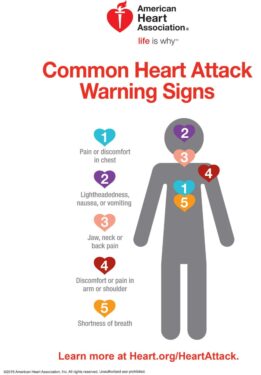No thanks to poor eating habits and unhealthy lifestyle (stressful work environment or lack of physical exercise), studies show that having a heart attack among people in their 20s or early 30s is increasingly becoming common, with one of every five heart attack patients younger than 40 years of age.
Additionally, a study on coronary artery disease among Malaysian youths found that almost 70% of participants aged 15-24 have at least one cardiovascular risk factor.
 Pic credit: American Heart Association
Pic credit: American Heart Association
With the increasing prevalence of heart disease among people in their youth, it is no wonder that the illness remains the No. 1 killer in Malaysia with almost one in every four deaths caused by heart disease.
On average, about 140 persons for every 100,000 people will suffer from a heart attack during their lifetime.
Below are seven symptoms one may have one month prior to a heart attack courtesy of the Daily Positive Information website.
Treating the below symptoms as red flags by seeking professional opinion from cardiologists or medical specialists can save one’s life:
If you have congestive heart failure, one or both of your heart’s lower chambers lose their ability to pump blood effectively. As a result, blood can back up in your legs, ankles and feet, causing edema.
When the arteries become narrow your heart receives a lot less blood than it is used to. This makes the heart work a whole lot harder than it normally would have to, leaving you feeling overly tired and drowsy just about all of the time.
When your heart is getting less blood this means it your lungs are not going to be able to get as much oxygen to the lungs as you normally would.
The two systems depend on one another so without one you cannot have the other. If you have been having trouble breathing it is best to consult a doctor as soon as possible as this could mean it is getting close to time for your attack.
When your body becomes weak all of a sudden, it is because the arteries are becoming narrower, hence not allowing blood to circulate properly. As your muscles are not getting what they need, this could lead to a fall even for what may seem at first no reason to be so careful.
- Dizziness and cold sweats
The poor blood circulation will prevent blood flow to one’s brain to be restricted. This is very life threatening. This will at first trigger dizziness and clamminess. You should not ignore this.
If you are having onset symptoms of a heart attack, chances are that you have been experiencing discomfort in your chest, whether it’s minor pain or built-up pressure. This will constantly increase until the attack itself happens.
If you feel as if you are having flu symptoms out of nowhere this could be because the attack itself is about to happen within the near future. Many people feel they have developed a cold just days before their attacks. – Sept 9, 2022